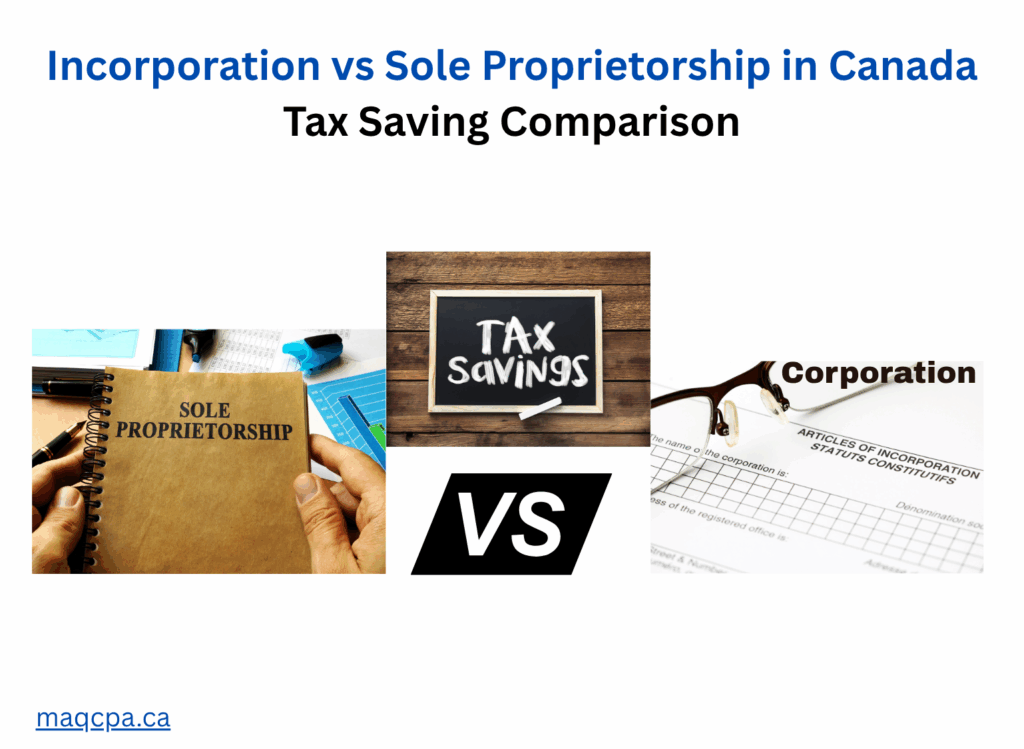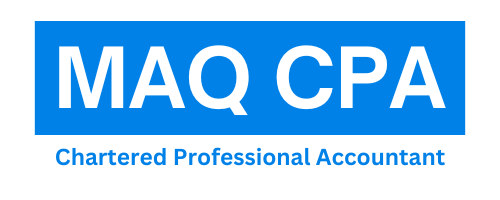If you’re running a small business or side hustle in Canada, you’ve likely asked yourself: “Should I incorporate, or stick with a sole proprietorship?” It’s one of the most important early decisions any entrepreneur can make about incorporation vs sole proprietorship — and tax savings are often a big part of that equation.
Thousands of Canadian businesses incorporate every year — and many do so primarily to reduce their immediate tax burden or tax deferral.
But incorporation doesn’t make sense for everyone, especially if your income is modest or you need to draw out every dollar personally. In this article, we break down how each structure (incorporation vs sole proprietorship in Canada) works from a tax perspective and help you determine which is better for your current — and future — financial goals.

Key Takeaways
- Sole proprietors report business income on their personal tax returns and pay graduated personal tax rates, which can be high as income increases.
- Incorporated businesses pay a flat corporate tax rate, generally lower than personal tax rates.
- Incorporation can lead to tax deferral, income splitting, and lifetime capital gains exemptions — but it also comes with added costs and responsibilities.
- Generally, incorporation starts making tax sense when your business earns more than $80,000 – $100,000 annually, and you don’t need to withdraw all of that income personally.
What Is a Sole Proprietorship?
A sole proprietorship is the simplest and most common business structure in Canada. You and your business are legally the same entity. You take on all the profits — and all the risks.
Tax Implications:
- You report all business income and expenses on your T1 personal tax return (via form T2125).
- Your net income is taxed at your personal marginal rate, which increases as income rises.
- You’re responsible for both the employer and employee portions of CPP contributions.
- There is no legal separation between your business assets and personal assets.
Example: If you earn $90,000 in net business income in Ontario as a sole proprietor, your combined federal and provincial tax bill could exceed 30%, depending on deductions and credits.
What Does It Mean to Incorporate a Business in Canada?
When you incorporate, you create a separate legal entity — a corporation — distinct from yourself. This is done either provincially (e.g., Ontario) or federally through Corporations Canada.
Tax Implications:
- The corporation files its own T2 corporate tax return and pays tax on its profits.
- Active business income up to $500,000 qualifies for the small business tax rate, typically 12%–15% depending on the province.
- You pay personal tax only on the money you withdraw (through salary or dividends).
- Liability is limited to the corporation — your personal assets are generally protected.
Comparing Tax Treatment: Incorporation vs Sole Proprietorship
| Feature | Sole Proprietorship | Corporation |
| Tax Filing | T1 (with T2125 form) | T2 Corporate Return |
| Tax Rates | Personal marginal rates (up to 53.53% in ON) | Small business rate (~12–15%) |
| Income Splitting | Not permitted | Possible (within TOSI rules) |
| Tax Deferral | Not available | Yes, on retained earnings |
| CPP Contributions | Pay both portions | Optional (dividends don’t trigger CPP) |
| Deductible Expenses | More limited | Often more flexible |
| Liability Protection | No (unlimited personal liability) | Yes (limited liability) |
| Start-up and Admin Costs | Minimal | Higher legal, accounting & filing costs |
When Does Incorporation Actually Save You Money?
While incorporation offers tax savings potential, it doesn’t always make sense — particularly if you’re withdrawing all profits for personal use.
You might benefit from incorporation if:
- Your annual net income exceeds $80,000–$100,000.
- You can leave some profits inside the corporation rather than withdrawing everything.
- You want to reinvest earnings, defer personal tax, or build up corporate savings.
- You’d benefit from income splitting with a spouse (within TOSI rules).
- You plan to sell the business eventually and want access to the Lifetime Capital Gains Exemption (LCGE).
Example: A small business owner earning $150,000 in profits might only need $75,000 personally. The remainder could stay in the corporation and be taxed at a much lower rate than if withdrawn personally — potentially deferring thousands in tax annually.
Additional Tax Advantages of Incorporating
1. Tax Deferral
Corporations pay a low rate on the first $500,000 of active income, and funds retained in the company are not immediately taxed personally. This allows for strategic timing of income.
2. Income Splitting
Corporations can issue dividends or pay salaries to spouses or adult children, potentially lowering overall household tax — but watch for Tax on Split Income (TOSI) rules.
3. Lifetime Capital Gains Exemption (LCGE)
If you sell the shares of a qualified small business corporation (QSBC), you may be eligible for over $1 million in tax-free capital gains (as of 2025).
4. Deducting Fringe Benefits
Corporations can sometimes deduct health insurance premiums, home office rent, and other expenses not easily deducted as a sole proprietor.
Costs and Compliance Considerations about Incorporation vs Sole Proprietorship
While incorporation provides clear tax planning opportunities, it also comes with additional administrative work and expenses.
| Requirement | Sole Proprietor | Corporation |
| Registration Fee | ~$60–$80 | ~$200–$500 |
| Annual Tax Returns | One (T1) | Two (T2 + T4/T5 if needed) |
| CRA Accounts Needed | Business Number (optional) | BN, GST/HST, Payroll, etc. |
| Accountant/Bookkeeping Costs | Lower | Higher |
| Annual Minutes & Filings | Not required | Mandatory |
| Liability Protection | None | Yes |
Note: The cost to incorporate and maintain a corporation is often $1,500–$3,000 annually, depending on your situation and advisor fees.
FAQs – Accounting Firms Scarborough / Toronto
Can I switch from sole proprietorship to incorporation later?
Yes — many business owners start as sole proprietors and incorporate later as revenue increases. If your business has assets or goodwill, you may need a Section 85 rollover to transfer assets tax-efficiently.
Is it worth incorporating if I only earn $50,000 a year?
Probably not. The tax benefits of incorporation are limited if you’re withdrawing all your income and don’t retain earnings or split income.
Do I need a lawyer to incorporate?
Not necessarily. While it’s possible to incorporate yourself online, consulting with a CPA or lawyer is highly recommended, especially when setting up share classes, minute books, or planning for future tax strategies.
Can I operate multiple businesses under one corporation?
Yes — but it’s important to structure your accounting and GST/HST reporting correctly. In some cases, a holding company or multiple corporations may be more tax-efficient.
Final Thoughts
Incorporation can be a smart move from a tax planning perspective — but it’s not always the right move right away.
If your income is still growing and you’re drawing everything out personally, a sole proprietorship may be more practical and cost-effective in the short term.
On the other hand, if your business is profitable, you don’t need every dollar to live on, and you want to build long-term wealth, defer taxes, or split income, incorporation can offer powerful advantages.
✅ Need expert advice tailored to your business?
We help Toronto and Ontario-based small businesses, entrepreneurs, professionals, and consultants assess whether incorporation is right for them — and we handle everything from CRA registrations to tax compliance and bookkeeping.
📞 Book a Consultation
Explore our Business Incorporation Services
Disclaimer
The information provided in this blog is for general informational purposes only and does not constitute professional accounting, tax, financial, or legal advice. While we strive to ensure the accuracy and timeliness of the content, the information may not apply to your specific situation or reflect the most current legislative changes. Readers are strongly advised to consult a qualified professional before making any decisions based on the content of this blog. MAQ CPA and its representatives disclaim any liability for any loss or damage incurred as a result of reliance on any information provided herein.
